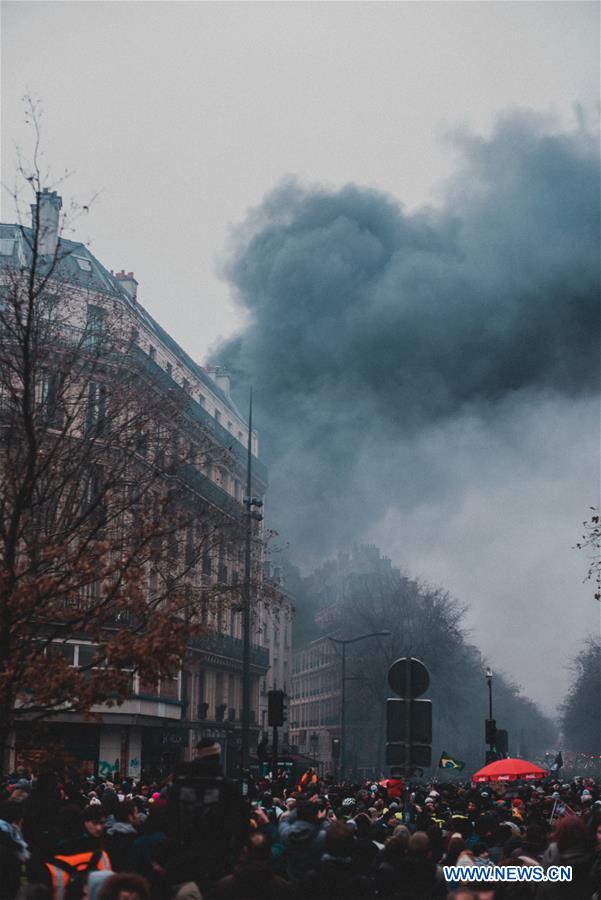 ?
?People take part in a demonstration in Paris, France, on Dec. 5, 2019. French Prime Minister Edouard Philippe on Friday justified a plan to overhaul pension regime, which triggered massive protests, but promised a social dialogue. (Photo by Yu Zhou/Xinhua)
PARIS, Dec. 6 (Xinhua) -- French Prime Minister Edouard Philippe on Friday justified a plan to overhaul pension regime, which triggered massive protests, but promised a social dialogue.
"We made the choice of social dialogue. We have met with as many unions' representatives ... as possible... The social dialogue is to respect the timetable which we have already defined, listen and try to insert proposals (into the planned reform)," Philippe said.
"I think that implementing a universal system that guarantees retirement for French and their children deserves an in-depth and clear debate," he added.
The prime minister pledged to detail next Wednesday the modalities to set on the contested reform, which, he said, would ensure "fairness, solidarity and soundness" of the country's pension system.
In one of his major campaign promises, President Emmanuel Macron proposes to merge the variety of 42 different pension set-ups for different professions into a universal system.
The new single regime would use points so that each euro paid in would give the same retirement benefits no matter which sector pensioners worked in.
That meant to scrap the special transport worker status, which allows workers to retire on full pension at 52, a decade before other French employees.
The government argued that the reform is needed to bring costly pension system into balance. Critics say that would effectively force people to work longer, in particular public sector workers who have been allowed to retire earlier often because of hard working conditions.
Locking horns with unions over pension system had put previous French governments on the hot seat.
In 1995, unions staged three weeks of strikes that paralyzed the country and forced then Prime Minister Alain Juppe to drop retirement reform plan and a program of welfare cutbacks, and resign.
The country's largest movement since 1968 forced then President Jacques Chirac to abandon the reform and dissolve the National Assembly.
More than two decades later, labor unions brought transport networks to a standstill on Thursday and Friday and staged country-wide street protests which drew at least 806,000 people angry at the planned pension reform.
A new day of strikes and rallies are planned on Dec. 10.
"Everybody in the street on Tuesday ... for a new day... of strikes, actions and protests," Catherine Perret, a representative of General Confederation of Labour was quoted by local media as saying.
"They (the government officials) have failed to measure to extent of the social discontent in our country and they'd better to come up with answers a little faster," she added.
On Friday, train traffic and metro networks were heavily disrupted for the second day as nearly a third of rail workers were on strike.
The state-run railway operator SNCF has cancelled 90 percent of high-speed TGV trains frequencies, while only three out of 10 regional trains operate.
On the Paris metro, nine out of 16 lines are completely shut and services severely limited on five others.
Earlier in the day, SNCF said it expected rail traffic would be heavily disrupted on Monday, as unions leaders voted to maintain their industrial action until Tuesday,
"Over the weekend, we expect to see a level of disruption similar to the past two days, with about 10 to 15 percent of trains available. It looks like Monday, it will still be very difficult," said Agnes Ogier, SNCF spokesperson.











